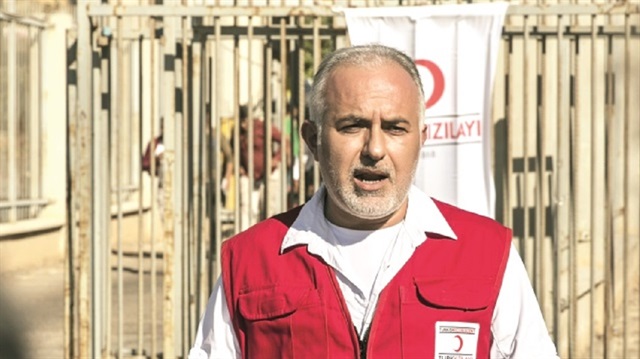
A battle in Idlib could spark a ‘new wave of migration’ that involves 2.5 million civilians, head of the Turkish Red Crescent Kerem Kınık warns
As the Assad regime and Russia shell the last opposition-held stronghold of Syria’s Idlib, humanitarian agencies are worried about internally displaced citizens and refugees flocking to Turkey and Europe.
Speaking to Yeni Şafak daily, head of the Turkish Red Crescent Kerem Kınık emphasized that if a battle breaks out in Syria’s opposition-held Idlib, hundreds of thousands of civilians would flee to Turkey and Europe, which would spell the start of a “new immigration wave.”
On Tuesday, Russian warplanes bombed several areas in the last opposition-held stronghold of Idlib, raising worries of a major assault by the Assad regime forces and its allies.
Stressing the importance of the international community’s need to gain the trust of Syrian civilians, he said: “The immigration issue is not a threat to Turkey alone, it can turn into an immigration wave toward Europe. This issue must be resolved at the [diplomacy] table. However, we have taken every precaution both in Turkey and Syria.”
The Turkish Red Crescent has been providing humanitarian aid to Syrians since March 15, 2011.
Stating that seven million civilians were internally displaced in Syria, “2.5 million of these people are in Idlib. A wave of fear could mobilize them. We witnessed this in Ghouta. It is impossible to govern this many people. This problem must be solved at the table.”
“Civilians in Idlib trust Turkey, not Russia or Iran,” he concluded.
Idlib, located in northwestern Syria on the Turkish border, has faced intense attacks by the Bashar al-Assad regime after a vicious civil war broke out in 2011. Since March 2015, Idlib is no longer under the control of the Assad regime and has been overrun by opposition groups.
The Turkish Red Crescent is continuing to take measures against a possible new migration wave from Syria’s Idlib and to manage the process efficiently they will implement the “help on the ground” strategy.
“We will increase the capacity of the designated refugee camps in the event of a new migration wave in the areas within the scope of the Euphrates Shield and Olive Branch operations. We will establish new camps if needed,” Kınık said.
He added that the organization has been supporting Syrians accommodated in 40 separate camps with 30,000 tents.
“We continue to dispatch tents and provide humanitarian relief. Mobile health vehicles will be added to our regular services in the near future. These healthcare vehicles will be used in the case of a possible emergency. Aid for the disabled, orphans, elders and widows will be increased. We will reach our goal by helping as many people as possible, Kınık said.
Syria has been locked in a vicious civil war since early 2011 when the Assad regime cracked down on pro-democracy protests with unexpected ferocity.
Since then, hundreds of thousands of people have been killed and more than 10 million others were displaced, according to UN officials.
Hello, the comments you share on our site are a valuable resource for other users. Please respect other users and different opinions. Do not use rude, offensive, derogatory, or discriminatory language.
The floor is all yours.












